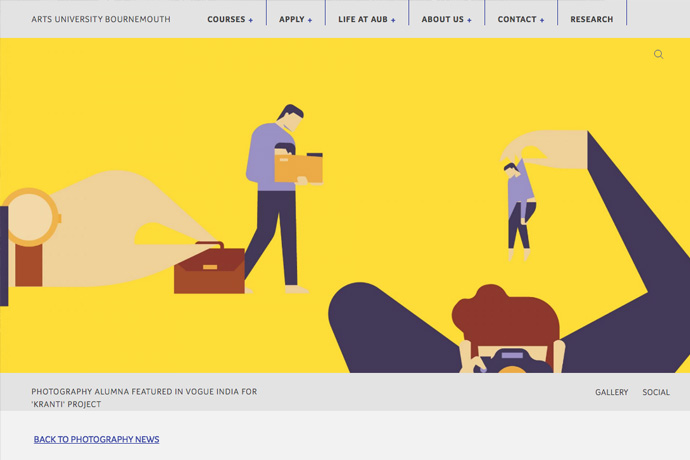
Photography Alumna Featured in Vogue India for ‘Kranti’ Project
BA (HONS) PHOTOGRAPHY GRADUATE, RADHA DATTA, WAS FEATURED IN VOGUE INDIA THIS MONTH IN RESPONSE TO HER EYE-OPENING PHOTOGRAPHY PROJECT WITH NON-PROFIT ORGANISATION (NGO), KRANTI.
Based in Mumbai, Kranti is a NGO shelter that empowers girls from red-light areas to become ‘agents of positive change’, by providing a healing home, education, and personalised opportunities.
The Vogue India web article explores Radha’s exper
We contacted Radha to find out more about her thought-provoking Kranti project and life since departing AUB:
Tell us about the Kranti project; why did you decide to do it and what do you want to convey through your images?
I’ve just started this project. The images are from a trip to Bombay. I stayed with the girls, fondly known as ‘Krantikaris’ or ‘revolutionaries’, and shared space, time, food, beds and realities with them for a week. I realised how important it is to educate people about these lovely girls. Their zest for life made me rethink my own priorities.
Previously, I attended a panel discussion for the Global Entrepreneurship Summit that was honouring women of substance. Robin Chaurasia, the co-founder of Kranti*, was one of them. She spoke about her journey and what Kranti was all about… I felt like I wanted to contribute [and be] part of something that was bigger than me and was just so pure in its conduct.
I reached out to Robin through a message on Facebook and that’s how it all started. They were kind enough to let me stay with them in their shelter. The idea to do a photostory came naturally to me because that’s the best way I know to express myself. I really feel the way society treats them as outcasts needs to change.
The girls have been through more than enough trauma. They really can’t change their past, nor can we. What we can do is make life easier for them. By easier, I mean what our society defines as ‘normal’… [The photo project] is my humble effort to use a medium I know best to help bring about change in how people perceive these delightful, enthusiastic girls.
Your photography is mainly centred around documenting people and their stories; are there any other subjects you’re interested in capturing?
I’ve realised lately that this is the reason I shoot and thoroughly immerse myself in it. Social documentary, like most things, is a two-way street. What I shoot is what I become. I consider myself to be a people’s person, you become a non-judgemental device to portray things how they are.
Capturing people and their realities provides you with such an array of emotions. Some witnessed and some unheard. But funnily enough, when one is capturing it, it’s almost like you’re experiencing the same thing for a nanosecond, and I feel that always stays with you. Who wouldn’t want to experience that?
What else have you been up to since leaving university? What do you have in the pipeline?
I started working with multiple state governments in India to produce their development reports which are produced in forms of Coffee Table Books. I was also lucky enough to be part of Mr Raghu Rai’s Coffee Table Book* on the Maha Kumbha festival last year.
Alongside these projects, I was a full-time employee with Invest India, constituted under the Ministry of Commerce and Industry. I started the Corporate Social Responsibility project in early 2017 to help educate children in remote areas of Rajasthan. It’s an ongoing project where we help corporates (based both within and outside of India) make education a right and not a privilege. Additionally, I was also a part of the Media and Brand Communications team and helped with social media, events, etc.
I’m also doing independent projects like Kranti and more CSR documentation/Social Documentary. As of now, a proposal to get funds for Kranti is underway as they’re barely managing to make ends meet. Here’s hoping I successfully get the word out through my work and use the right approach to achieve what I set out to do. I’m very keen to have an exhibition in about a few months where I’ll be able to raise enough money to donate to Kranti.
*Find out more about Radha’s 2015 coffee table book with the state government of Madhya Pradesh.
How did your time at AUB prepare you for the real world?
Freedom. It taught me to be less scared of my thoughts. My professors (all of them) were kind enough to give me time to explore myself as they realised how new all of this was for me. We’re talking borderline overwhelming! They were there to keep a check on every insecurity and helped me bounce back.
I’ve always had a problem with articulation. I think I’ve made a massive progress – thanks to my time at AUB. It really helped me have a strong sense of self, which is very important for an artist and a person to grow and blossom to the best of their capabilities.
You are already doing so well since graduating but what is your ultimate career goal?
I really wish I had more clarity on this, but what I do know, is that I’m on the right path. Thankfully, I don’t for a single second feel the need to rethink my field of work and that gives me a fair amount of satisfaction. But yes, if all goes well, maybe the next feature will have a yellow frame around it.
Source: https://aub.ac.uk/

